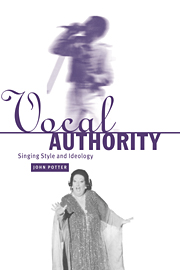Book contents
- Frontmatter
- Contents
- Preface
- Acknowledgements
- Chapter 1 Classical ideology and the pre-history of singing
- Chapter 2 The medieval period: religion, literacy and control
- Chapter 3 The Italian baroque revolution
- Chapter 4 The development of the modern voice
- Chapter 5 Concerts, choirs and music halls
- Chapter 6 Armstrong to Sinatra: swing and sub–text
- Chapter 7 Early music and the avant-garde: twentieth-century fragmentation
- Chapter 8 Elvis Presley to rap: moments of change since the forties
- Chapter 9 Singing and social processes
- Chapter 10 Towards a theory of vocal style
- Notes
- List of references
- Index
Chapter 2 - The medieval period: religion, literacy and control
Published online by Cambridge University Press: 22 September 2009
- Frontmatter
- Contents
- Preface
- Acknowledgements
- Chapter 1 Classical ideology and the pre-history of singing
- Chapter 2 The medieval period: religion, literacy and control
- Chapter 3 The Italian baroque revolution
- Chapter 4 The development of the modern voice
- Chapter 5 Concerts, choirs and music halls
- Chapter 6 Armstrong to Sinatra: swing and sub–text
- Chapter 7 Early music and the avant-garde: twentieth-century fragmentation
- Chapter 8 Elvis Presley to rap: moments of change since the forties
- Chapter 9 Singing and social processes
- Chapter 10 Towards a theory of vocal style
- Notes
- List of references
- Index
Summary
Since the Renaissance, historians have been accustomed to periodising history into a number of compartments which perpetuate the Renaissance view of history, a view which sees an authenticity in ancient culture (especially that of classical Greece and Rome) which is the yardstick by which subsequent ‘ages’ are measured. So the source of all true intellectual and artistic activity is seen to go underground during the ‘middle’ ages (which are initiated by a ‘dark’ age), to be rediscovered in the ‘renaissance’ of classical ideals. While the invasions of the northern tribes disrupted both the social and economic order, there is relatively little evidence of intellectual hiatus. At the peak of tribal expansion there is a dearth of written material, but this is an indication of the difficulties that any civilisation faces at times of such crises: the Ordines Romani of the eighth-century Roman mass are informed by the same ideals as the patristic writers of the fifth century, which is a powerful argument for the continuity of classical ideals. During this period and the later Middle Ages, classical thought became an important ideological foundation to ideas about how singing functioned both in religious music and in secular courts, as notational systems were devised which ensured the primacy and authority of written music. This ideology took firm root in the church, with its unique access to literacy and its significant social position, ensuring a development of what we might loosely call ‘art music’.
- Type
- Chapter
- Information
- Vocal AuthoritySinging Style and Ideology, pp. 14 - 30Publisher: Cambridge University PressPrint publication year: 1998

